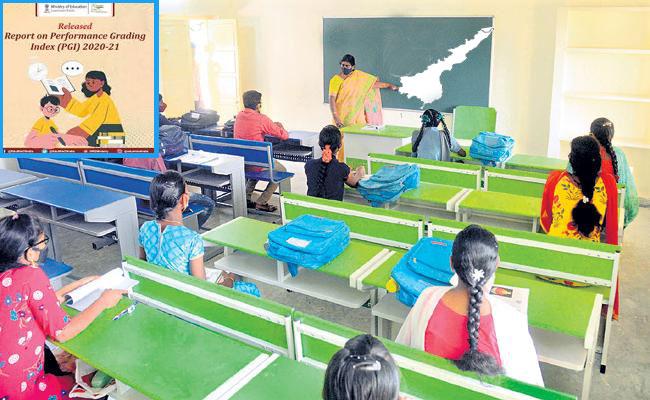Performance Grading Index 20-21: Andhra Pradesh Achieves Level 2 In School Education Systems

NEW DELHI: The State of Andhra Pradesh has attained Level -2 grading in the Performance Grading Index (PGI) for States and Union Territories for 2020-21 in 2020-21. The Ministry of Education released the PGI on Thursday, and as per the index a total of seven States and Union Territories namely Andhra Pradesh, Kerala, Punjab, Chandigarh, Maharashtra, Gujarat, and Rajasthan have attained Level -2 grading
Andhra Pradesh Gujarat and Rajasthan were the new entrants with the highest achieved level.
PGI 2020-21 classified the States and UTs into ten grades of which the highest achievable Grade is Level 1 for the states scoring more than 950 points out of a total of 1000 points. The lowest grade is Level 10 which is for a score below 551.
It is a unique index for evidence-based comprehensive analysis of school education systems across States and UTs.The prime objective of PGI is to promote evidence-based policy-making and highlight course correction to ensure quality education for all.
“The Indian Education System is one of the largest in the world with about 14.9 lakh schools, 95 lakh teachers, and nearly 26.5 crore students from varied socio-economic backgrounds. DoSE & L (Department of School Education and Literacy) devised PGI for States/UTs to provide insights and data-driven mechanisms on the performance and achievements of the success of school education across all States/UTs," the ministry said in a statement. So far, the department has released the PGI report for the year 2017-18, 2018-19, and 2019-20.
As per the PGI reports, Andhra Pradesh got 154 points out of 180 in learning outcomes, quality, student enrollment ratio - 80 out of 77, infrastructure 127 out of 150, equality 210 out of 230, and policy governance 334 out of 360.
AMARAVATI: Andhra Pradesh Chief Minister YS Jagan Mohan Reddy while speaking during a review meeting with the School Education Department officials held on Thursday, said that they should consider the investment in the education sector as the biggest investment on human resources development and hence. He said that officials should not compromise on the implementation of reforms that would help improve literacy and eradicate poverty.
He told them to implement the subject-teacher concept more effectively. He said that the reforms helped the number of students grow up to 42 lakhs now from 37 lakhs in 2018-19. Of the total number of 45,000 Government schools, the Nadu-Nedu scheme has already been implemented in 15000 schools while another 22,000 schools will implement it this year with the rest of the schools implementing it next year.
Also Read: Investment in Education Sector is Biggest Investment in Human Resource Development, Says CM YS Jagan




